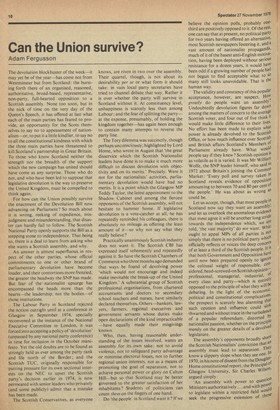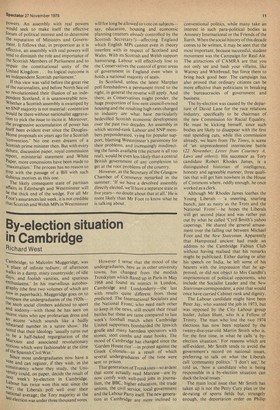Can the Union survive?
Adam Fergusson
The devolution blockbuster of the week—it may yet be of the year—has come not from Westminster but from Scotland: the burst ing forth there of an organised, reasoned, authoritative, broad-based, representative, non-party, full-hearted opposition to a Scottish assembly. None too soon, but in the nick of time on the very day of the Queen's Speech, it has offered at last what each of the main parties has feared to provide, an opportunity for the Scots them selves to say no to appeasement of nationalism—or, to put it a little kindlier, to say no to all the constitutional kindness with which the three main parties have threatened to kill Scotland's partnership in Great Britain. To those who know Scotland neither the strength nor the breadth of the support which the new campaign has united should have come as any surprise. Those who do not, and who have been led to suppose that legislative devolution is the way to preserve the United Kingdom, must be compelled to think again.
For how can the Union possibly survive the enactment of the Devolution Bill now advancing on Parliament ? So much about it is wrong, reeking of expedience, misjudgment and misunderstanding, that disaster can hardly fail to follow. The Scottish National Party openly supports the Bill as a stepping stone to independence. That being so, there is a deal to learn from asking who else wants a Scottish assembly, and why.
An answer is almost superfluous in respect of the other parties, whose official commitments to one or other brand of parliamentary devolution have become louder, and their contortions more frenzied, the greater the headway the SNP has made. But fear of the nationalist upsurge has encompassed the heads more than the hearts—the leadership, not the bodies—of those institutions.
The Labour Party in Scotland rejected the notion outright until at a conference in Glasgow in September 1974, specially reconvened at the instance of the National Executive Committee in London, it was forced into accepting a policy of 'devolut ion' (unpassed by any national party conference) in time for inclusion in the October manifesto. Yet the old doubts are to be found as strongly held as ever among the party rank and file north of the Border; and the Scottish TUC, originally responsible for putting pressure for its own sectional interests on the NEC to upset the Scottish party's decision earlier in 1974, is now permeated with senior leaders who privately (and some publicly) admit that a mistake has been made.
The Scottish Conservatives, as everyone knows, are riven in two over the assembly. Their quarrel, though, is not about its
desirability per se or what form it should
take: in vain local party secretaries have tried to channel debate that way. Rather it is over whether the party will survive in Scotland without it. At constituency level, unhappiness is scarcely less than among Labour; and the fear of splitting the party-at the expense, presumably, of holding the kingdom together—has again been enough to contain many attempts to reverse the party line.
The Tory dilemma was succinctly, though perhaps unconsciously, highlighted by Lord Home, who wrote in August that 'the great disservice which the Scottish Nationalist leaders have done is to make it much more difficult to discuss devolution with objectivity and on its merits.' Precisely. Were it not for the nationalists' activities, parliamentary devolution would have had no merits. It is a point which the Glasgow MP Teddy Taylor, the latest appointment to the Shadow Cabinet and among the fiercest opponents of the Scottish assembly, will not hesitate to hammer home. If legislative devolution is a vote-catcher at all, he has repeatedly reminded his colleagues, there is absolutely no mileage in offering the least amount of it—so why not say what they really believe?
Practically unanimously Scottish industry does not want it. The Scottish CBI has expressed itself vehemently and repeatedly against it. So have the Scottish Chambers of Commerce who three months ago demanded that ways be found of devolving power 'which would not encourage and indeed make inevitable the break-up of the United Kingdom.' A substantial group of Scottish professional organisations, from chartered accountants and doctors to secondary school teachers and nurses, have similarly declared themselves. Others—bankers, lawyers, farmers, regional executives and government servants whose duties make open declarations of the kind impracticable —have equally made their misgivings known.
Who, then, having reasonable understanding of the issues involved, wants an assembly for its own sake: not to avoid violence, not to safeguard party advantage or minimise electoral losses, not to further regional union interests, not as a means of promoting the goal of separation, not to achieve personal power or glory on Calton Hill—but so that Scotland may be better governed to the greater satisfaction of her inhabitants? Students of politicians can count them on the fingers of one hand.
Do 'the people' in Scotland want it ? If we believe the opinion polls, probably onethird are positively opposed to it. Of the rest, one can say that at present, no political party
for two years having offered an alternative, most Scottish newspapers fostering it, and a vast amount of nationalist propaganda, much of it of the basest anti-English motivation, having been deployed without serious
resistance for a dozen years, it would have been odd if a growing number of people had not begun to find acceptable what to so many still looks unavoidable. That is the human way.
The validity and constancy of this popular acceptance, however, are suspect. How greatly do people want an assembly? Undoubtedly devolution figures far down among the matters of concern to the average Scottish voter, and four out of five think it would make little difference to their lives. No effort has been made to explain what power is already devolved to the Scottish Office, or how much influence over Scottish and British affairs Scotland's Members of Parliament already have. What would people say if they knew ? Scottish opinion is as volatile as it is varied. It was Mr
Wolfe, the SNP leader himself, who said In 1972 about Britain's joining the Common Market : 'Every poll and survey taken in Scotland reveals evidence of opposition amounting to between 70 and 80 per cent of the people.' He was about as wrong as could be.
Let us accept, though, that most people in Scotland now say they want an assemblY: and let us overlook the anomalous evidence that most agree it will be another long stride towards the independence which, we are told, 'the vast majority' do not want. What ought to appal MPs of all parties is 11°I simply that there is no political party which officially reflects or voices the deep concern of at least a third of the Scottish people. It is that both Government and Opposition have until now been prepared openly to ignore the colossal weight of responsible, considered, head-screwed-on Scottish opinion', professional, managerial, industrial. °I every class and party—which is entirelY opposed to the principle of what they will be debating. In the light of the economic' political and constitutional complicatio1s. the prospect is scarcely less alarming tha,t such opinion and influence could si0 thwarted and without trace in the turbulence of a popular referendum, distorted nationalist passion, whether on the princlPle, merely on the greater details of a devolve° legislature. The assembly's opponents broadly share the Scottish Nationalists' conviction that" assembly must lead to separation. They know a slippery slope when they see one. In 1970, in his note of dissent from the Douglas; Home constitutional report, the Principal °I Glasgow University, Sir Charles Wilson. argued simply : An assembly with power to question Ministers authoritatively... and with Power to legislate within a restricted field would seek the progressive extension of those powers. An assembly with real powers would seek to make itself the effective forum of political interest and to determine the reputation of Ministers and Government. It follows that, in proportion as it is effective, an assembly with real powers will tend to diminish the role and importance of the Scottish Members of Parliament and to Impair the constitutional unity of the United Kingdom . . Its logical outcome is an independent Scottish parliament.'
If this view was valid before the great rise of the nationalists, and before North Sea oil SO revolutionised their illusion of an independent Scotland, it is unanswerable now. Whether a Scottish assembly is swamped by an SNP majority is not material: contention would be there without nationalist aggravation to pick the issue to incite it. Moreover, the progressive accumulation of power has Itself been evident ever since the DouglasHome proposals six years ago for a Scottish convention.' No one even dreamt of a Scottish prime minister then. But with every debate, discussion paper, royal commission report, ministerial statement and White Paper, more concessions have been made to maximal ism.' The process has no reason to stc9 with the passage of a Bill with such dubious motives as this one.
The likely consequent state of partisan affairs in Edinburgh and Westminster will be the thick end of the wedge. For all Mr Root's assurances last week, it is not credible that Scottish and Welsh MPs in Westminster will for long be allowed to vote on subjects— say, education, housing and economic planning (matters already controlled by the Scottish Secretary !)—affecting England which English MPs cannot even in theory interfere with in respect of Scotland and Wales. With its Scottish and Welsh support hamstrung, Labour will effectively lose to the Conservatives the control of great areas of government in England even when it holds a national majority of seats.
In Scotland, unless the latest Marplan poll foreshadows a permanent trend to the right, in general the reverse will apply. And there, as Conservatives might ponder, the huge proportion of low-rent council-owned housing and the resulting high rates charged to industry are what have particularly bedevilled Scottish economic development over the past two decades. An assembly in which second-rank Labour and SNP members preponderated, vying for popular support, blaming Westminster's parsimony for their problems, and increasingly misdirecting the funds available (the picture is all too real), would be even less likely than a central British government of any complexion to get at the root problems of the country.
However, as the Secretary of the Glasgow Chamber of Commerce remarked in the summer: 'If we have a devolved assembly directly elected, we'll have a separate state in five years—no doubt about that at all.' He is more likely than Mr Foot to know what he is talking about.











































 Previous page
Previous page